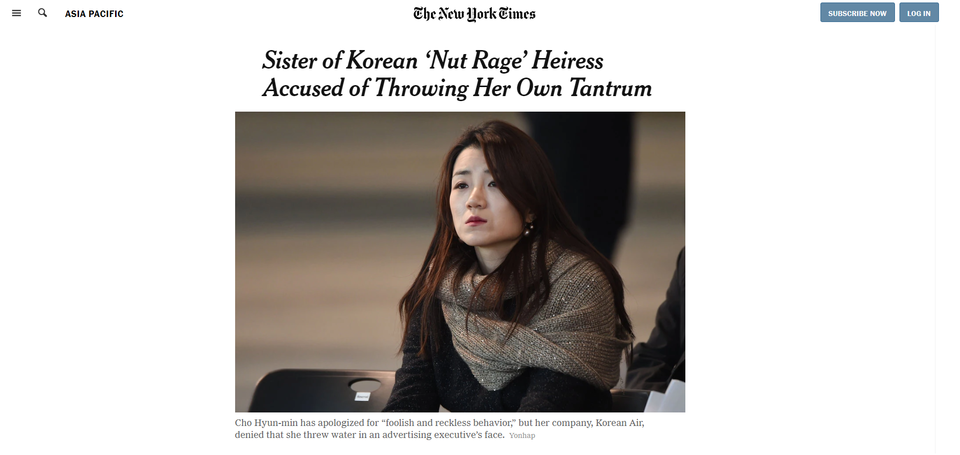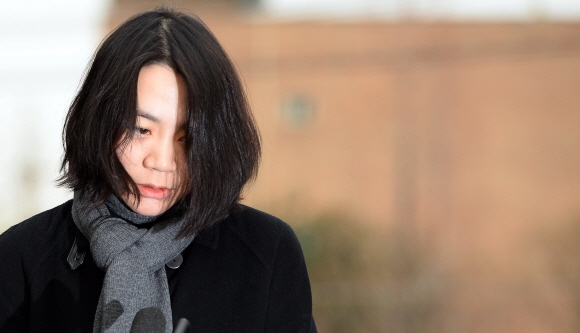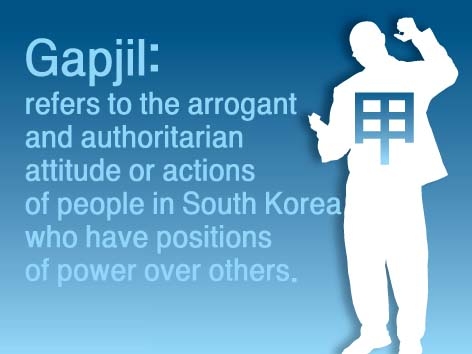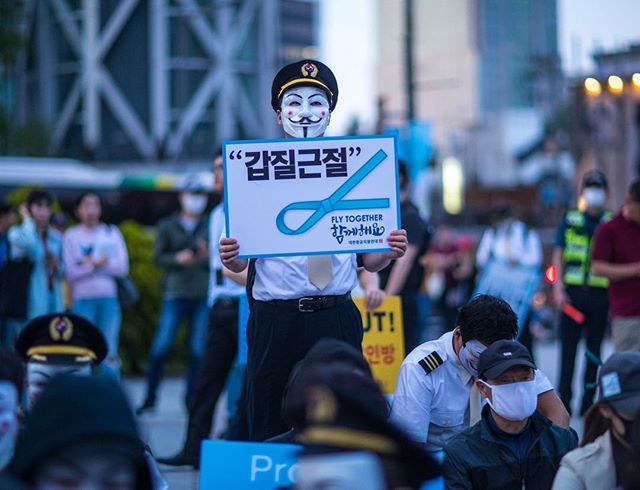Nut rage, was a story penned by The New York Times regarding Cho Hyun—ah, Vice-President of Korean Air. Ms. Cho was enraged when a flight attendant served her macadamia nuts in a plastic bag instead of on a plate. She made the airplane return to Incheon Airport with all 250 passengers on board. This is a classic example of “Gapjil” or when senior staff members physically or mentally abuse their subordinates. Gapjil culture only exists in South Korea and many people suffer at the hands of this traditional and irrational system of hierarchy in our national companies. Indeed, according to Se-gye Ilbo research, nearly 78.5% of people have suffered the effects of Gapjil. That is more than 2 out of 3 people. Among them, 76.1% said they did not react to the situation nor did they stand up for themselves. More than 70% believe that launching a complaint against a senior employee will not result in any changes and more than half of them stated they were afraid of being disadvantaged for raising the matter. Research shows that Gapjil has already spread rampantly throughout our society and victims will not and what’s worse cannot speak out because there are currently no rules in place protecting their rights.
 |
| ▲ The New York Times reported 'Gapjil.' (photo by The NewYork times) |
While the previously mentioned nut rage incident is one of the most famous Gapjil cases in Korea, it isn’t the only one garnering media attention. Cho Hyun-Min, President of Hanjin Travel Company and Vice President of Jin Air, who happens to be the younger sister of Cho Hyun-Ah, was also embroiled in controversy after she threw a cup of water at staff from an advertising agency. During a meeting with the group, the younger Ms. Cho was angry with the answers she was getting to her questions, so she threw a glass of water at an executive of the advertising company. Meanwhile, in April 2016, Jeong Woo-Hyun, President of MPK the parent company of Mr. Pizza, attempted to enter his office in a locked building in Seoul. The door of the building was locked because the security guard was trained to seal it after 10pm. However, Mr. Jeong was not satisfied with the security guard’s reasoning, so he struck him on the neck and chin. While these situations are significant, they represent only a few cases out of hundreds that take place every day. However, as a result of these notorious cases, employees of Korean Air held a candlelight vigil every weekend. Three labor unions at Korean Air led the peaceful protest and later opened a kakako talk chat for workers to post more about their Gapjil experiences at the company. Shortly after, workers from various companies across the country launched ‘Gapjil 119’ a site for users to talk about their problems related to this archaic and unjust practice.
Despite these very real complaints, Gapjil is a social phenomenon that persists in our country for many reasons. Firstly, in Korean society, many cultural organizations emphasize a strict system of hierarchy in their working environment, so people tend to get used to it and simply tolerate it. Second is the fact that the largest companies in Korea are privately owned. Therefore single families dominate the top roles in major companies, even if they are minority shareholders in the firm. Due to this unclear company management structure, head families are able to exert their influence and remain unchecked. Furthermore, as a result of this systemic error, members of these influential families can actually return to their former position even after they caused a major Gapjil scandal.
 |
| ▲ Cho Hyun-ah retired vice president of Korean Air. (photo by Seoul Newspaper) |
For example after three years, Ms. Cho, who was retired because of the 'nut rage' scandal, assumed the role of President for the KAL hotel network, a subsidiary of the Hanjin Group. And her sister, Cho Hyun Min became board member 4 years later with the company providing her with her own car charging station. These examples clearly demonstrate that there is a long way to go before we can bring about any real change to the system of Gapjil. The final reason is the imbalance of power. There is imbalance of power between people and even between companies, for example a major company and a subcontractor. According to ‘Gapjil 119’ Samsung, LG Display, and Posco do not guarantee subcontractors minimum wage. Also, in 2018 March, Daelim Industrial, another major Korean company, asked for money and other valuables from their subcontractor using their superior status. These are clear examples of abuse of power where Gapjil is being used to justify this unprofessional behavior.
The Dankook Herald (DKH) interviewed Kim Eun-jeong of the People’s Solidarity for Participatory Democracy who is currently trying to come up with a realistic solution for this complicated problem. Kim argued that the law must limit the use of Gapjil and there are a number of legal changes proposed, including those that apply to a variety of sub-contracts, a revision to the Fair Trade Act and a revision to the commercial law, not only from the 18th National Assembly, but also from the 19th National Assembly. The problem is that while a law may be proposed, it remains difficult to pass in the National Assembly. Although the side effects of these cases have become a social issue amid the widespread culpability of chaebols and large families, there have been no practical measures passed that address the matter. Therefore, the law should eradicate this malfunctioning practice so that the rights of subordinate workers can be guaranteed.
 |
| ▲ What is Gapjil? (photo by Seoul Newspaper) |
Kim also believes that voluntary efforts on behalf of the company are also important. Hyundai corporation, is a group that has spurred hundreds of businesses through partnerships with smaller companies. For instance, they supporting a rational and fair trading culture between primary and secondary or tertiary suppliers. However, even if the company operates under these programs with the goal of ensuring a ‘fair process’, it is not really easy to implement under the current sub-contract structure. Therefore, in this situation, the major company, in the dominant position in this trade relationship, should make the first effort. It is also important to ensure the voluntary efforts of the company actually work under the current boss-subordinate relationships. Korean Air also stated they would take actions to eliminate this detrimental practice after the nut rage incident, but its own efforts clearly failed when the Cho Hyun-min incident occurred. In other words, to ensure voluntary efforts actually work, larger companies in the dominant position of the trade relationship should work proactively to see the change is real.
It is also necessary, Kim argued, to create an proactive social perception with the public, so that companies would take into consideration their potential customers when they feel like acting out. If the society actively responds to Gapjil, their voices can become a far more important catalyst for change by altering market demand and impacting the company’s bottom line. Since consumers have power to build a widespread public opinion that encourages change in laws and even punishment for companies that treat the coworkers poorly, it is time to mobilize their support to put and end to the practice of Gapjil.
 |
| ▲ The employees of Korean Air is protesting against owner family's Gapjil. (photo by Lee Hee-hoon instagram) |
The time has come for change in our country's Gapjil culture. The change is not only for the good of society, but also for the benefit of companies that need to develop their awareness of good business practices and achieve voluntary maturity. This requires the attention of consumers and active participation in a pressure campaign to seek out change. Together we can make a difference for a better working environment.
윤진현, 정유진, 김민, 신지희 dankookherald@gmail.com

![[Campus Magnifier] Let's Surf the Library!](/news/photo/202404/12496_1765_4143.jpg) [Campus Magnifier] Let's Surf the Library!
[Campus Magnifier] Let's Surf the Library!
![[Campus Magnifier] Let's Surf the Library!](/news/thumbnail/202404/12496_1765_4143_v150.jpg)





